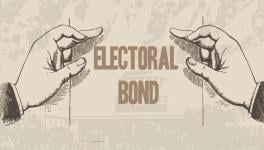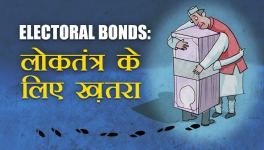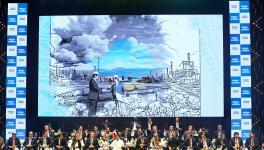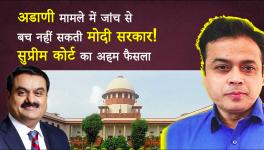Discussion on Gas Wars: Crony Capitalism & the Ambanis
Newsclick speaks to Paranjoy Guha Thakurta, Commentator and Journalist, on his latest book Gas Wars: Crony Capitalism and the Ambanis. The book was released on April 18. Guha says this book analyses the Krishna Godavari Gas Pricing controversy and details the impacts of crony capitalism in India. Guha and his co-authors along with the distributors of the book have been served legal notices by the Reliance Industries Limited seeking Rs 100 crores for defamation.
Prabir Purkayastha (PP): Hello and welcome to Newsclick. Today we have with us Paranjoy Guha Thakurta - commentator, journalist and who has written this book on gas wars which is currently in the news not because its been covered by the media as something which is important and so on but because Mukesh Ambani has filed a case against him for damages, worth about 100 crores.
Paranjoy Guha Thakurta (PGT): Its not a case that has gone to court, there have been legal notices that have been served on me, my co-authors, those who are distributing the book, which includes Amazon, which includes Flipkart, and its even been served on those who reviewed the book, its been served on a young woman; her only quote-unquote crime was that she forwarded some electronic invitations for the launch event of the book which was on the 15th of April. As of now the case hasn't gone to court, there have been two legal notices served on me and my co-authors by Khaitan and company representing Reliance Industries Limited and its chairman and managing director Mr. Mukesh Ambani. There have been three sets of notices including one – a reply to the reply that my lawyer has given and there is also another legal notice that came from Mulla and Mulla on behalf of the younger Ambani brother that's Mr Anil Dhirubhai Ambani who heads the ADAG Ambani group and that's where it stands, and though the legal notices have alleged that I have defamed Mr Mukesh Ambani and Mr Anil Ambani and they want me to stop and ensure that the book is no longer sold; all its copies are pulped, to take out every bit of information about the book from the website which is www.gaswars.in; actually none of that has happened because it hasn't gone to court and these are legal notices which are sometimes given to intimidate or harrass or brow-beat people. There is a term for it, it is called SLAPP, Strategic Lawsuits Against Public Participation.
PP: Or legal bullying.
PGT: Yeah you are right, so the idea is not only to intimidate the author and those connected with the publication, and I am the publisher of the book besides being the lead author, it's also meant to have the chilling effect on others so that the others don't do anything similar to what we have done.
PP: But from what the headlines in the papers say, that this is the notice asking for 100 crores in damages. So Paranjoy how does it feel to be asked for 100 crores in damages? It's simply a large sum; you must be feeling good.
PGT: When my wife heard about this, she said, “ You don't even have one crore, where are you going to get 100 crores from? Are you going to get us on the streets.” So I had to tell her that don't worry, these things happen but I am reasonably confident that there is nothing in the book that can be construed to be criminally defamatory. Not a single fact which is given in this book, the main book runs into 400 pages, there are 200 pages of appendices and annexures. Not a single fact has been refuted or challenged. It's just that my interpretation of those facts, my opinion based on those facts are a matter of contention because if I have described Mr Mukesh Ambani as an oligarch, he is not happy with it, if I have described how the two brothers fought over Krishna-Godavari gas and that was one of the reasons why the two brothers parted ways and if I have described them as avengeful and greedy and if that is construed to be defamatory, I don't think so. I don't think I have got my facts wrong anywhere, I also know that I have given their version i.e., Mr Mukesh Ambani's version or spokesperson or representatives of his company and their version in considerable length.
PP: I'll come to the book just one second, just hold your horses for a second. The other thing that is interesting is that you brought the two brothers together and that's a big achievement. Both of them filed suits against you.
PGT: No, no. That happened long before, they officially patched up. I believe this was more to tell the world they were not actually fighting any more, they wanted to tell the government also they were not fighting anymore and I think also there are some business interests involved – sharing of infrastructure including telecom infrastructure, which could benefit both brothers.
PP: Yeah, some of it is also Anil Ambani's empire being slightly at a weaker footing and therefore the need to make up with Mukesh Ambani and get some money for certain sharing of infrastructure. Yes you are right they had made up before so you are not the sole reason for their having made up.
PGT: I would like to believe otherwise. You would like to believe otherwise.
PP: But it's still an achievement, they both have come together, you know, together on this book.
PGT: I plead guilty.
PP: Now coming to the book. There are three major, shall I say, areas of the book that we could talk about. One is really I would call the Murli Deora period in which we saw the first phase of the battle in which the two Ambani brothers fight, it brings out a lot more material. You see the basic issue is that Indian media never published anything about the Ambani empire before and material was really not available. Even the one book which came on Dhirubhai Ambani, as you know, really never been able to print in Indian market.
PGT: Let me correct you on a few facts. Hamish Mcdonald wrote his book, his first book, Polyster Prince.
PP: That's an abolished book by the way.
PGT: But then he subsequently updated that book and it's called Ambani and Sons and is published by Roli books and is freely available. There are other books also on the Ambanis. Alam Srinivas has written a book on the brothers fighting. So yes there is a fair amount of information about the brothers in the public domain including these two books and if you look at the structure of the book – there are four broad sections of the book. The first four chapters really talk about how the fight between the two siblings may have been on an account of a 101 reasons including maybe that at one stage Nita didn't get along with Tina but what I have argued is that the main reason why Dhirubhai Ambani's corporate empire got partitioned was really over the two brothers squabbling about how gas from the Krishna-Godavari is to be utilised; how it is to be priced. So I think that's the first four chapters of the book.
PP: That's also the period when Murli Deora was very much the minister.
PGT: It also goes into the history of how Dhirubhai Ambani rose, you know, to become India's biggest enterprenuer. So it goes back a little bit into history, it looks at how people like Mr Arun Shorie who as a writer for the Indian Express was very critical of Dhirubhai Ambani and then became one of his biggest fans after he was no more.
The second part of the book deals with the report of the Comptroller and Auditor General and how the CAG said that the manner in which the production sharing contract was structured, the manner in which, you know, sort of, investment multiples were worked out was heavily rated against the interests of the exchequer and the people of this country to favour the contracting firm, the priviledged few. And the two chapters of the book that contains exclusive information, one is the last interview that the former chairman of the Oil and Natural Gas Corporation, Subir Raha gave me before he passed away and the other is a meeting that was held behind the closed doors by the former Petroleum Minister, Mani Shankar Aiyar and he gave a speech and I got hold of a copy of his speech and it is truly amazing because here is a minister in the Congress government who is very critical of his predecessor Murli Deora and at one stage is even suggesting that the fact that price of the gas went up from $2.34 to 4.20 per unit. That “420” is a significant number in India.
PP: Char Soo Bees (420) in Indian context.
PGT: Let me take one or two more minutes. The third part of the book really talks about an ecological disaster that could happen. This has not been reported in too much detail but what I have argued on the basis of findings by environmental scientists and geologists.
PP: That's the part which deals with the K-G basin sinking.
PGT: That's correct.
PP: You said that there are reports to indicate, again, by different scientific figures that this could be due to the way the under ground exploration is taking place.
PGT: And this could affect one of the most fertile parts of the country. Often described as the rice bowl.
PP: Salinity, rise of the saline water.
PGT: And the last part of the book is really about the nexus between businees and politics. The circumstances which led to Mr Jaipal Reddy being “kicked upstairs” and made minister for Science and Technology and the way in which Mr Veerappa Moily replaced him and how this whole issue of pricing of gas became a highly poticised issue and it still remains a very very political issue and there are a set of legal entanglements which are yet to be resolved.
PP: You could call it the story of four ministers as well because you have, Murli Deora, Manish Shankar Aiyar,
then you have Jaipal Reddy and then you have Veerappa Moily.
PGT: And then it could also be about two brothers, and it could also be about a whole set of technocrats including some very sincere and honest bureaucrats and technocrats who insisted that the truth be out and then resisted a lot of pressure.
PP: Also people like Tapan Sen, Member of Parliament.
PGT: And Gurudas Dasgupta who is a petitioner.
PP: So there have been a lot of figures who have fought this but the reality has been as you said essentially the kind of influence the Reliance empire has weilded on the government has led to successive problems, price of gas being one of them, but also possible environmental damage which you have identified as the effect of really not doing scientific exploration and extraction of gas and last of course on what the price of gas has been, that's the other part.
PGT: That's correct and who is entitled to this natural resource, under what terms and conditions. At the end of the day, this is a natural resource which is supposed to belong to the people of this country.
PP: Let's go one by one. Let's look at the first part of book which is the riddle what I would call the Murli Deora regime in which the Ambani empire broke into two and of course what we had was really the investment of the Reliance was making was being jacked up, from in fact, from 2 billion it was made almost 8 billion and the price of the gas was also increased. This was broadly what happened and it seems that Murli Deora played a very important role in this.
PGT: Mr Murli Deora as Hamish McDonald had others noted, he was always close to the Ambani family, to Dhirubhai Ambani in particular, there's no doubt about that, he himself has said so, but he is not the only person, even our Rashtrapati Mr Pranab Mukherjee has on more than one ocassion acknowledged his proximity to the family of the Ambani's.
PP: He was also the head of the EGoM which fixed the gas price.
PGT: Absolutely correct. He was then the External Affairs Minister. What is interesting is that you see what happened is that the brotheres had a series of problems but what really proved to be the breaking point in my opinion was when Anil Ambani who wanted to build India's biggest, Asia's biggest, one of the world's biggest gas based power plants at Dadri, not very far from Delhi and it was dependent on not only getting gas from the Krishna-Godavari basin located at more than 2000 km away but also getting the gas at a price of $2.34 per unit for a 17 year of period, because that was what the National Thermal Power Corporation had in response to a tender floated by the NTPC, that's what Reliance Industries had agreed to. But that matter too is in court, that matter too is a matter of dispute. When Anil Ambani realised that this was not happening, he unleashed a series of public advertisments where he named Mr Murli Deora, so that was very unusual. You know in our country where you have industrial captains of industry, corporate captains, capitalists; they may have a host of differences with a cabinet minister or a minister but rarely are these differences in public but in this case it was all over, it was all over the papers. The whole world and his brother knew. So that was also something very very unusual which has been sought to be documented in this book.
PP: That infact was what I was referring to earlier. Ambanis have been able to control what comes out in the media and adverse material rarely has come out atleast in Dhirubhai Ambani's time, infact the brothers breaking out, not the cracks from here and there that might have happened. The brothers falling out, if you will, is one of the big reasons by which one side of the media became anti Mukesh Ambani and the other side became anti Anil Ambani and then we even have Neera Radia tapes, where you can hear Neera Radia talking about the campaigning against Anil Ambani and the involvement of some of the journalists in that.
PGT: You know there was a period which lasted approximately 2 years when both sides were desperately trying to influence the media. So there were individuals close to both the brothers who were leaking out, you know literally washing the dirty linen of the family in public, you know, all about complex share holding patterns, how Mukesh Ambani, you know, his degree, whether he actually got the degree or not, how various companies and how various complicated associations took place.
PP: It's an interesting point that you are making because one of the arguments that I am sure you are aware of, that a lot of investment companies own Reliance shares and all their offices are supposed to be located in the Ambani headquarters. So it seems to be a lot of it is really, sort of, circulating through the company, coming back as investments and so on. So the question also that Anil Ambani at one point of time was raising was about the ownership of Reliance itself.
PGT: Certainly, infact many people argue and this is written in the book that when Dhirubhai Ambani, when he was alive, he had perhaps, may have had an inkling that may be his two sons may not get along with each other as he would have liked them to. So he sort of built a corporate conglomerate which was truly amazing in its complexity as you say crossholdings, you know, company A holding company B,C,D and F inturn holding X,Y,Z and it was really.. to find out the true pattern of ownership you would have to draw the complicated family trees of each company and then they were really hundreds and hundreds of closely held companies, private companies and all of this was such a complex pattern including HUFs or Hindu Undivided Families and trusts that it was believed that it would not be possible to disentangle this complexity but eventualy when the two brothers started fighting with each other, all this entered the public domain. Any private-corporate conglomerate has its principal goals of how to maximise returns to the share holders, to maximise profits, so that in itself is nothing, it is the way the government failed to uphold the interests of the exchequer and the public at large. The manner in which contracts were structured, the manner in which regulatory mechanisms were subverted, the rules were bent, the contracts tailored, that is the real story.
PP: If you remember Paranjoy, we have discussed the story in Newsclick with you and as well as you have written about it, I have written about it, so that part of the story where you actually jack up from what used to be known to be $1 cost of gas 2.34 was the two contracts that was existed, one with the Anil Ambani's group and the other with the NTPC, then it becomes $4.02.
PGT: And now with the new Rangarajan formula, it would nearly double.
PP: Rangarajan formula and what Mr Veerappa Moily has done or what Montek Ahluwalia's Planning Commission has proposed, all of it means doubling to 4.2 to 8.4 or so, which somebody has called as double 420 (char soo bees).
Now this is one part of the gas story how the government has been involved in raising the price on principles which are really open to question, because as you have raised earlier, you said very clearly – who owns the gas. Do the people of the country own the gas? And are there therefore Reliance has been given the contracts to do certain activities to bring out the gas and been compensated for that. Or does the Reliance own the gas? This is the central issue.
PGT: There is no ambiguity, no doubts whatsoever.
PP: Across the board, globally it has been held to be country's resource and they are only licencees to bring it out and distribute it. That's the maximum you can talk about it and therefore this principle of saying we own the gas and therefore we should get adequate price for it, is completely a wrong premise. I think between us and what discussions we have had in Newsclick earlier is clear.
PGT: Absolutely correct.
PP: The other issue, the second part of your book which is really about the CAG report and how the costs were inflated, that you have got to go in detail and again this is information which is known, but you have also talked about the Subir Raha interview. So we can talk about it because that's not in the public domain.
PGT: You see Subir Raha was suffering from cancer at the time I met him. It was the last interview he gave and he took great pains to explain these issues of – the issue of national sovereignty, the issue of ownership of natural resources, how the nature of contractual obligations and it's worth reading because with great lucidity and detail he explains it. I remain a lay person and he was the expert and he shows how we see a systematic undermining of sovereignty; we see how those who are supposed to be upholding the interests...
PP: Guardians of the country...
PGT: That's right, the trustees, the custodians of the natural resources, they themselves undermined the interests of the people. So that's one area where he talks about in considerable detail and it fixes into a pattern.
PP: Please give some examples, for instance.
PGT: He talks about instances when India had entered into deals with Qatar and the prices had collapsed but Qatar agreed to continue to supply the Liquified Natural Gas to India at a high price though it had to incur losses because it upheld the letter of the contract that had been entered into between Qatar and India to supply the LNG i.e., Liquified Natural Gas and it was at a certain price and the prices flared up above the price at which Qatar was supposed to. So theoretically Qatar incurred a loss by selling to India at a price which was lower than the prevailing market price but because it had entered into a long term contract with India it continued to meet its contractual obligation. You know, this was one of the issues that had to be discussed. When you have a contractual obligation then there are certaing risks that have to be taken. So these are some of the issues that Mr Raha explained in some detail. He also talked about this whole issue of minerals, who do these minerals belong to, how are they valued, how are they priced. At the end of the day, the government, if it truly represents the people, it has to act in the interests of the people. What happens with the government which is supposed to represent the interests of the people ends up subverting those interests and benefitting the privileged few. These were some of the issues that Mr Raha talked about in great detail and he explained why the brothers fought like the way they did because it was so crucial for both brothers, it was literally “either-or”, either you win, you succeed as an enterprenuer or I do and eventually as we know, the younger brother lost out but it's interesting to even read what one of the judges of the Supreme Court made in his statement, where he talks about predatory capitalism. So this is, in a sense, the worst forms of capitalism because we are looking at extractive industries and this is where the worst forms of capitalism, historically across the world, has happened and you are seeing that replicated in India and at one level it's the third world phenomenon what you describe as the resource cursed. The resources which belong to the people actually end up... that the presence of those resources becomes the reason why local populations including indigenous communities are oppressed and suppresed and lose out.
PP: You know that's a very important point you are talking about, predatory capitalism, extractive industries and it's also interesting because it really dovetails very easily with what's happening now which is raising the gas prices again to twice its value and as we know the implications are the rise of cost of electricity and probably about 28,000-30,000 MW of gas based stations idling because at that price they will not be able to sell to to grid; that part is quite clear or we'll have to subsidise it and of course the huge fertilisers subsidy that they have to pay.
PGT: Ok. You are absolutely correct, though natural gas has many many uses as was pointed out in a note to the cabinet committee on economic affairs, due to the sharp fall in the production of gas from the Krishna-Godavari, the D-6 block of the Krishna-Godavari basin, the total losses even extrapolated could be in the region well over 50,000 crores-54,000 crores. The CAG never quantified this amount but others did and what are these? As you have rightly pointed out the main losses are on account of electricity not being generated, plants lying idle and fertilisers, so you could argue that electricity is subsidised, fertilisers are subsidised but at the end of the day the subsidies have to come from somewhere you know it's the exchequer that pays for it.
PP: Or the peoples' pockets will pay for it.
PGT: Exactly. Even if it is not passed on to the consumer at the end of the day this is an expenditure, this is not just an opportunity cost, but a loss to the economy as a whole and what we see is that at different points of time natural gas can be used even for transportation and for cooking and what not, but the other important point that should be noted and you will allude to it is what is the cost of production. There are all kinds of speculation but why is the government reluctant to have an independent assessement of what is the cost of production and the whole issue is you can't compare apples with oranges. What is often said is, if we don't produce more gas, if the gas price doesn't go up you will have to import liquified natural gas at a much higher price but you cannot compare the world over prices of liqified natural gas which have international prices, bench mark prices like crude oil with the price at the one head because that is like at the point at which gas is coming out and then why should that priced in US dollars, you can also argue that. Is Coal India's coal priced in U.S dollars?
PP: So that goes back to the question Paranjoy, if it is your own resource, this belongs to the people of this country then how can it be priced in dollars and what is the relation to the international market price in any case?
PGT: That's because the way natural gas markets have fragmented and prices vary from place to place and this is one of the criticism of the Rangarajan formula.
PP: Paranjoy, the issue is very simple - if the cost of production is not going up and if it is my production, my gas which only Reliance is bringing through the well up, then why should it's price be linked to the international price.
PGT: And to add to what you said and this is the point that the Comptroller and the Auditor General really sort of emphasised over and over again in the manner in which the investment multiple is structured in the production sharing contract, it actually encourages higher expenditure on capital or capital expenditure.
PP: If you are gold plating then your share under the production sharing contract increases so if the price of gas increased and you had the same production sharing contract and the same capital cost, a large share of it would have gone to the Government of India but if you gold plate the contract, the government doesn't gets it share.
PGT: That's right and for your information, the price, the captial expenditure has gone up hugely and the price hasn't because what was expected to come out, only one-forth of it has actually come out, Reliance says it is due to geological complexities, uncertainities, surprises but there is a section within in the government that says Reliance Industries Limited, the contracting firm didnt dig sufficient number of wells and didn't conduct the necessary tests, that's why it's been alleged that it squatted, hoarded, not relinquished the areas they should have relinquished so that they could be auctioned. So there are series of claims, series of counterclaims, all of it is right now in Supreme Court, there are a sleu of allegations including allegations of money laundering through a company in Singapore, all of these will have to be resolved at the end of the day in the Supreme Court and to be fair to those who are watching me, I am a member of the Governing Council of Common Cause and Common Cause is one of the petitioners in the Supreme Court, so in the interest of disclosure, I should also mention that.
PP: You know the last point that you have already made is of course of predatory capitalism which you talked about how it is used to loot the people and you talked about the resource curse but it's interesting in Venezuela and Brazil one of the reasons they have been able to pull out people from poverty, very large numbers which they have done, it's because they used the mineral resources, actually, oil and gas for doing this. It's petro-gas in Brazil and oil in Venezuela. This is the main difference between the Manmohan Singh government and what the Lula government and what the Venezuela Hugo Chavez did.
PGT: All I can say Prabir is we seem to have emulated the worst practises from across the globe and not the best practises and especially when it comes to the utilization and pricing of natural resources we certainly have a long way to go and much to learn from the rest of the world.
PP: Particularly when it comes to coal and gas, the spectrum, the three areas that we have discussed n number of times here at Newsclick.
PGT: They all seem to fall into a pattern, a common pattern.
PP: And it's very much a part of what you said, predatory capitalism and as I was talking about this is the mould which was broken by Lula's government and Hugo Chavez's government and that is really what a lot of countries can do. Both models are there now in front of us and now we have to see that what the new government does or doesn't do – whether it follows the same model because as we have seen what the Adani empire did in Gujarat which was really based on real estate, land, access to land and also power contracts so we have to see whether that model will be followed or the government will follow a different model.
PGT: And we'll have to wait and watch how the Supreme Court delivers on the whole host of these very complicated and contentious issues, including the issues of arbitration, you know, not only on the pricing but also on the penalties that are imposed on RIL for allegedly, deliberately supressing output of gas. These are the host of the issues that need to be adjudicated upon and time alone will tell to what extent, whether or not we are able to get out of the kind of situation that we have been in, in the recent past.
PP: Thank you very much Paranjoy, I think this has been an excellent overview of what your book is all about and I hope we can read the book.
PGT: And once again www.gaswars.in you can visit the website.
PP: And also the various cases in the Supreme Court and hopefully your case as well bring us more light on these issues. Newsclick will be watching this issue and we would be with Paranjoy time and again to see how this issues, particularly, coal, oil, spectrum develop, because these issues are something close to Paranjoy's heart and also something that Newsclick has been involved with. Thank you very much.
PGT: Thank you Prabir.
Get the latest reports & analysis with people's perspective on Protests, movements & deep analytical videos, discussions of the current affairs in your Telegram app. Subscribe to NewsClick's Telegram channel & get Real-Time updates on stories, as they get published on our website.























